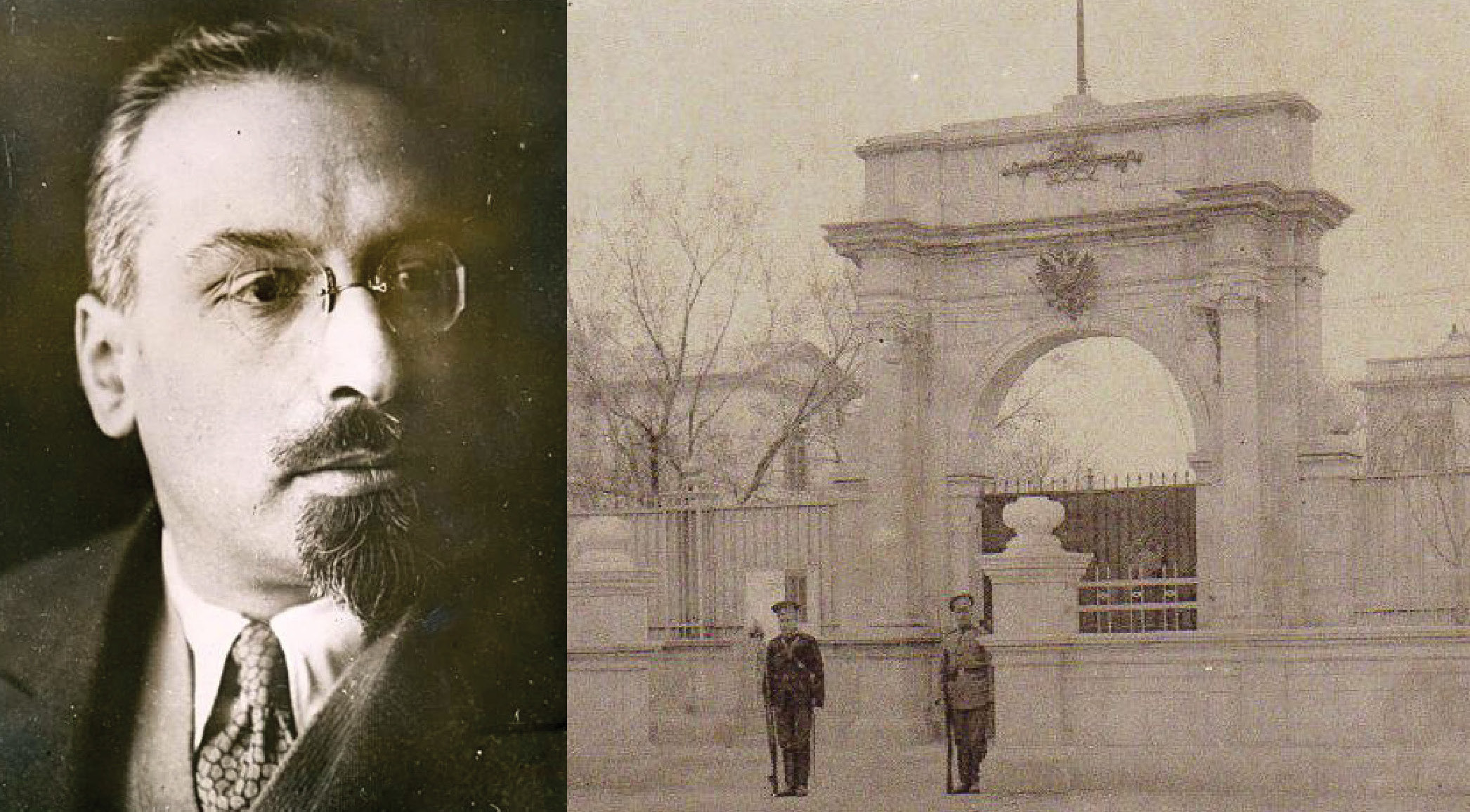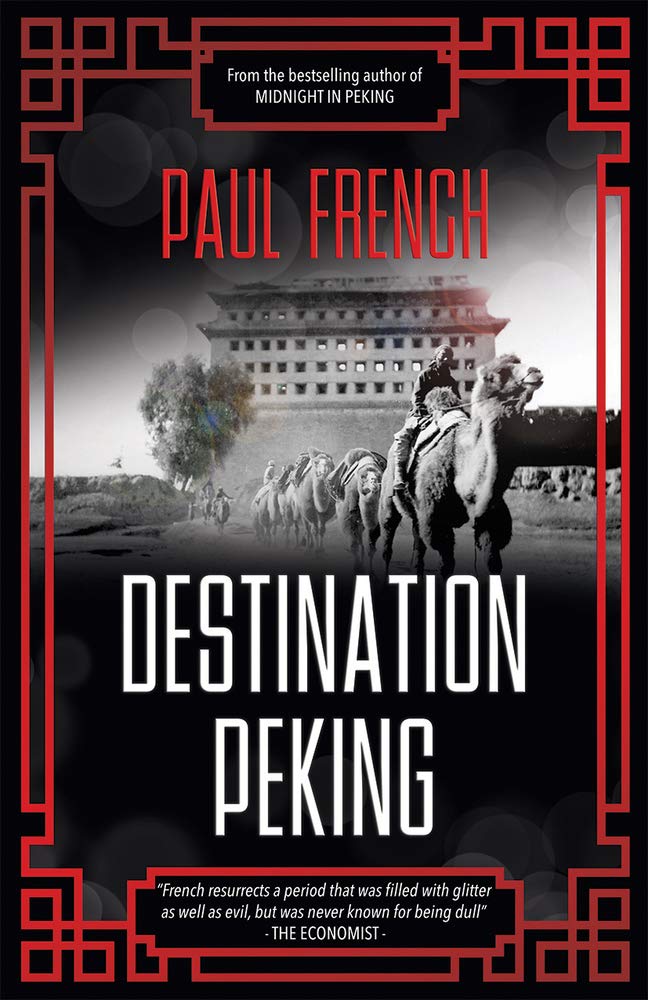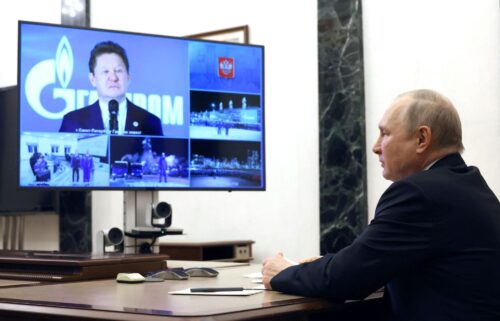Beijing’s favorite Bolshevik
In this excerpt from Destination Peking, abridged and lightly edited for The China Project, author Paul French introduces us to Lev Karakhan, a Bolshevik whose work as the Soviet Union’s first ambassador to China earned him the trust of the early Chinese republic’s most powerful leaders.

Lev Mikhailovich Karakhan’s Bolshevik credentials were impeccable. His style — invariably knee-high leather boots, a Tolstoyan peasant smock, pence nez, and de rigueur goatee — characterized early 1920s Moscow. A true revolutionary celebrity often photographed with his lover, the beautiful lead Ballerina of the Kirov, Marina Semyonova. The Italian journalist Curzio Malaparte wrote that, “Karakhan was the handsomest man in the Soviet Union.”
Born in Tbilisi, Georgia, to an Armenian family in 1889, Karakhan’s ascendancy was swift. By 1971 he was a full member of the Bolshevik’s Revolutionary Military Council and close to Leon Trotsky. Between 1918 and 1920 he was appointed Deputy People’s Commissar for Foreign Affairs with a special interest in China.
Nowadays, not many people remember the Karakhan Manifesto, but in July 1919, it was an important document that rather upset the apple cart of the Great Powers and their “Spheres of Influence” in China. Karakhan formally announced that the new Bolshevik state was relinquishing most of its (“unequal”) treaty rights in China formerly held by Imperial Russia — all treaty port rights, the Russian Concession in Tientsin (modern-day Tianjin), Moscow’s share of the Boxer Indemnity payments, and control of the Russian-managed China Eastern Railway (CER).
Karakhan’s Manifesto was unsurprisingly extremely popular with many younger Chinese urbanites feeling empowered after the May 4th demonstrations. It was a propaganda coup for the new Soviet Union, and Karakhan knew that such a move would not only improve Bolshevik-Chinese relations, but would hopefully make Marxism-Leninism a more attractive ideology in China, bolstering the emerging domestic communist movement. This analysis perhaps paints Karakhan’s move too cynically — it was also, he believed, the right thing for the new Soviet state to do. Karakhan hoped the Manifesto would provide a solid Sino-Russian bulwark against Japanese incursion towards Russia’s borders, Mongolia, and even farther west into contested Xinjiang, which suffered from religious-inspired independence movements and British Great Game shenanigans.
However, six months later, Karakhan took back several of the pledges in his Manifesto. Primarily, he renounced the inclusion of the China Eastern Railway. Russian rights over the railway were reaffirmed. Similarly with the Boxer Indemnity monies. Karakhan insisted Russia would oversee the continuing payments, rather than just scrap them.
Despite this climb down on the original 1919 Manifesto, the general Chinese public’s opinion of the new Bolshevik state, Marxism (if not always Leninism), and Lev Karakhan himself remained overwhelmingly positive, if perhaps not absolute. So naturally there was a lot of interest in China when, in 1923, it was announced that Karakhan was himself coming to Beijing as the first Soviet ambassador to China.
China Bolsheviks
In April 1923, China was split. While sending Karakhan to Beijing, the Soviet Union had also decided to politically assist Sun Yat-sen (孫中山 Sūn Zhōngshān), who had formed a rival “southern government” in Guangzhou. The Soviets had skillfully, though a little precariously, made friends and were influencing both sides. Moscow sent a team of military men to help train an army in Guangdong province. In June, five Soviet officers arrived in Beijing for language training, while a veteran Bolshevik, Mikhail Gruzenberg, soon known to all in China by the alias Borodin, was dispatched to China as the Soviet’s principal adviser to Sun Yat-sen. Grigori Voytinsky, who had experience in Russia’s Far East and with China’s earliest organized communists, took over as Moscow’s principal adviser to the new Chinese Communist Party, then based in Shanghai. This was the new Communist International’s China “dream team” of so-called sovetniki advisers — Karakhan in Beijing, Borodin in Guangzhou, and Voytinsky in Shanghai.
Borodin and Voytinsky’s roles were essentially semi-secret and somewhat covert. However, Karakhan’s diplomatic post was obviously and by necessity more overt as was his primary mission, to secure diplomatic recognition of the Soviet Union from China. In September 1923, Karakhan was waved off with full Bolshevik pomp as he took the Trans-Siberian Express into China before transferring to the contentious China Eastern Railway, passing through Harbin, Changchun, and Shenyang before arriving in Beijing.
The Soviet legation
Karakhan went straight to the former Russian Embassy in the heart of Beijing’s Legation Quarter and almost opposite the American Embassy. Quite what state the Russian legation was in is unclear. After the Bolshevik Revolution, the Tsarist ambassador, Prince Nikolai Kudachev, had been formally dismissed from the post by Moscow. Ignoring any communications from the Bolsheviks, Kudachev, now a stateless “White” Russian émigré, continued to live on in the embassy buildings for a further three years, until the Peking (or “northern”) government, courted assiduously by Karakhan, withdrew its recognition and Kudachev had to vacate the premises in 1920. No Russian official had lived there for three years.
With the Kudachev family evicted, Karakhan took over the embassy. Technically he was now the most senior foreign diplomat in China — he was an ambassador, whereas all the others were mere envoy extraordinary and minister plenipotentiary (or simply “minister”), considered a diplomat of the second class. This automatically made him dean of the diplomatic corps, and so always the closest foreign envoy to the senior Chinese leaders. Karakhan may have been a Bolshevik and publicly decried bourgeois manners, but personally he liked a bit of pomp and circumstance and was a stylish man.
On August 9, 1924, Karakhan presented his credentials to the president of China (at that time the warlord Cáo Kūn 曹锟). Time Magazine wrote that he was “clad in immaculate evening clothes, shod in shining leather, gloved in white kid, and wearing a glossy silk hat.” He rode in a gilded state coach (a dusted down relic of the Tsarist legation days, presumably), drawn by six ebony horses and escorted by 24 cavalrymen.
Though he was in the northern capital, Karakhan continued to play both sides, and immediately dispatched a telegram to Dr. Sun Yat-sen in the south, calling him “an old friend of the New Russia.” Sun replied offering support and goodwill. This was a slightly odd move by Karakhan, as it indicated to the Beijing government that Karakhan’s and, by extension, Moscow’s support was ultimately for Sun and his rival southern government in Guangzhou. This was probably no surprise to the revolving series of northern warlords who took control of Beijing in the 1920s. Sun wrote to Karakhan telling him that if the Waichiao Pu (China’s Ministry of Foreign Affairs at the time) refused to recognize the Soviet Union, then Karakhan should move his embassy south to Guangzhou. Sun also told Karakhan that he had sent his own “trusted chief of staff and confidential agent” to Moscow “to discuss ways and means whereby our friends there (in Moscow) can assist me in my work in this country (China).” That trusted chief of staff and confidential agent’s name? Chiang Kai-shek (蔣介石 Jiǎng Jièshí).
The doyen
Karakhan’s progress was swift. He had crucially managed to establish Chinese recognition of the Soviet Union by May 1924. The Soviet legation had become a center for nationalist and radical activity in Beijing, helped by the northern warlord Feng Yu Hsiang’s (冯玉祥 Féng Yùxiáng) conquering of the capital that spring: the so-called “Christian General” had ousted the previous Zhili Clique, invited Sun to Beijing, made an alliance with the Kuomintang, and expelled the last emperor Puyi from the Forbidden City. Things had turned around to the extent that Sun was able, after medical treatment in Japan, to travel by train to Beijing, where he was met at the station by Mikhail Borodin (though by now Sun’s medical condition was acute and he knew he was dying of liver cancer).
The United Press correspondents covering Beijing politics now took the general view that the days of the old Great Powers holding sway were over and that Karakhan was all-powerful. He was said to occupy the best seat of honor whenever the Chinese president held a reception. For the first time, a major power was seemingly on the inside track with the Chinese government, not by gunboat diplomacy, forcing unequal treaties or diplomatic pressure, but through apparent friendliness and support. Karakhan was unafraid to call the British and French “imperialists” while arguing against the American position (put forward by the former American ambassador to China Jacob Gould Schurman) that China would “evolve” to full national strength. Not “evolution,” replied Karakhan, but “revolution” is what would return China’s national strength.
Such had been his rapid success in playing both sides and winning official recognition for the Soviet Union that, by 1925, Karakhan seems to have felt that his time in Beijing was already coming to an end. It was the case that the domestic situation in northern China of endless warlord skirmishes, rival cliques, and factional subterfuge tired him. There was little to recommend favoring one warlord over another. The social round of the Legation Quarter was not wholly to his taste…endless balls, lavish dinners, but often with people he considered (quite rightly in many cases) his intellectual and social inferiors and whose politics he often found objectionable (a view obviously reciprocated by many).
Karakhan thought that the interminable internal wranglings of China would never result in anything seriously revolutionary. In 1925 he spoke with Paul Blanschard of The Nation. Karakhan told him that China was a “rear-guard engagement” in the international workers’ struggle.
Sun Yat-sen died in the Rockefeller-funded Peking Union Medical College just off Wangfujing on March 12, 1925. He was just 58. Karakhan immediately ordered the red flag to be flown at half-mast over the Soviet Embassy. He also ordered a specially made coffin from Moscow, identical to the one Lenin had been laid to rest in barely a year before. Sun Yat-sen’s funeral procession through the streets of Beijing was held on March 19. Karakhan occupied the prominent place of the chief mourner.
The Black Prince
Lev Karakhan returned home to Moscow in August 1925 the way he had come originally, heading up through Manchuria on the China Eastern Railway and then back across the vast haul of Siberia on the Trans-Siberian Express. Back in Moscow he once again assumed the post of Deputy People’s Commissar for Foreign Affairs. Karakhan remained closely involved with Russia’s China policy and the activities of those colleagues still in China, including Borodin. Since Sun’s death in April 1925, Chiang Kai-shek was now the major figure on the right of the Kuomintang, though still in competition with his major rival on the left, Wāng Jīngwèi 汪精衞. Eventually Karakhan and Borodin decided that Chiang could be handled. It was not their best decision ever.
Passing through Moscow in 1929, Curzio Malaparte encountered Karakhan once again, noting, “a tall, athletic man, his head proudly erect atop two broad shoulders…Karakhan, in his language from the Eastern Steppe, means ‘Black Prince.’” A Bolshevik for sure, but still a rather dandyish one it seems: “His clothes, his ties, his shoes, his shorts, his gloves, all came from London by diplomatic courier from the Soviet Embassy in St. James’s Square.”
Karakhan finally married his ballerina Marina Semyonova just before Stalin personally decided she should be transferred from the Kirov to the Bolshoi in Moscow. In 1934 Karakhan was appointed Soviet ambassador to Turkey. Marina was allowed to visit Paris to dance with Serge Lifar at the Paris Opera Ballet. Then, in 1937, Karakhan was recalled to Moscow. On September 20, 1937, he was, as he probably realized was likely to happen, immediately arrested and summarily executed in Stalin’s purges with a bullet to the back of the head.







